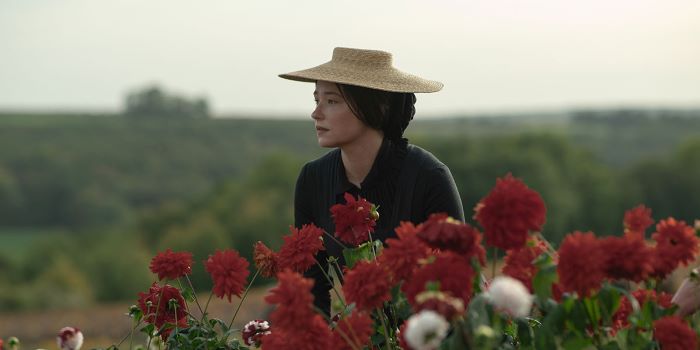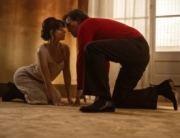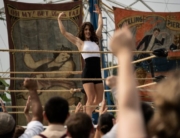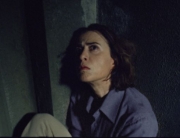How do you condense a remarkable life like that of Barbe-Nicole Ponsardin Clicquot (1777–1866), who revolutionized the French champagne industry, into a 90-minute biopic? Drawing on Tilar J. Mazzo’s best-selling 2008 biography The Widow Clicquot, Erin Dignam’s script for director Thomas Napper’s elegant second feature film (after Jawbone) focuses on her crucial early years, from Barbe-Nicole’s arranged 1798 marriage at age 21 to Franc?ois Clicquot through his death in 1805 and the end of the Napoleonic Wars.
The film opens as Franc?ois (Tom Sturridge) introduces his wide-eyed bride (a radiant Haley Bennett) to his vineyard at Verzy, the “most beautiful in all of Champagne.” In the next scenes, a grief-stricken Barbe-Nicole is dressing for her husband’s funeral while rival champagne makers such as Monsieur Moët (Nicholas Farrell) circle like vultures, eying her land.
The 27-year-old widow, despite her demure appearance, reveals herself to have a backbone of steel when she refuses Moët’s offer to buy the vineyard despite the protestations of her father-in-law, Philippe (Ben Miles). “Franc?ois willed the vines to me because he knew I would never sell them,” she tells Philippe, shaming him into supporting her efforts to continue her late husband’s work.
Through Richard Marizy’s skillful editing, the film weaves easily between Barbe-Nicole’s struggles to turn the failing wine business into a success and her blissful memories of her early years with Franc?ois when he teaches her the art of winemaking. This includes, in a tender scene, singing to the vines: “They like you,” he says. “They think you are perfect.”
But her thoughts of her marriage turn darker as François’s mood swings deteriorate into mental instability and Barbe-Nicole’s initial attempt to sell a new champagne fails disastrously. Now on her own and in charge, she proposes to her wine merchant Louis Bohne (a flirty Sam Riley) that they bypass Napoleon’s embargo of trade with France’s enemies. It becomes an ill-fated gamble when the widow learns her first shipment to Amsterdam has spoiled.
Despite the ruinous setback, a determined Barbe-Nicole persists in her experiments, including resolving the sediment issue that had bedeviled champagne producers for centuries. In her personal life, she embarks on an affair with the bisexual Louis—the film implies he also had an intimate friendship with Franc?ois. But business always comes before pleasure: She commands Louis to leave her office one late night when he tries to interrupt her work with romantic attentions.
This relationship and Louis’s success in selling her 1811 Comet vintage to Tsar Alexander I spur her jealous competitors to take Barbe-Nicole to court on the charges that she has violated the Napoleonic Code that banned women from owning businesses, even though it exempts widows. The film ends with a satisfying final line that pops like a fine bottle of Veuve Clicquot champagne.
Acclaimed cinematographer Caroline Champetier (Annette) alternates between the use of natural light to vividly capture the beauty of the Clicquot vineyards (filmed in Burgundy at the Château de Béru) and dark shadows to depict a household deep in mourning. Sumptuous set decor by production designer Jean-Hughes de Chatillon and lavish period costumes by Marie Frémont add to the authentic-looking atmosphere.
The subtitle of Mazzo’s book is The Story of a Champagne Empire and the Woman Who Ruled It. So it’s understandable why the director and screenwriter chose to focus on a few key years and to alter historical details for dramatic impact. (The official cause of Franc?ois’s death was typhoid, although rumors abounded that he committed suicide because his business was failing.) Yet one wishes the filmmakers had explored more fully the business savvy that the “grande dame of champagne” developed as she turned a small French vineyard into a global endeavor. Perhaps a limited series like Apple TV’s The New Look, which explored the lives of Christian Dior and Coco Chanel during World War II, could flesh out the widow Clicquot’s fascinating later years.

















Leave A Comment